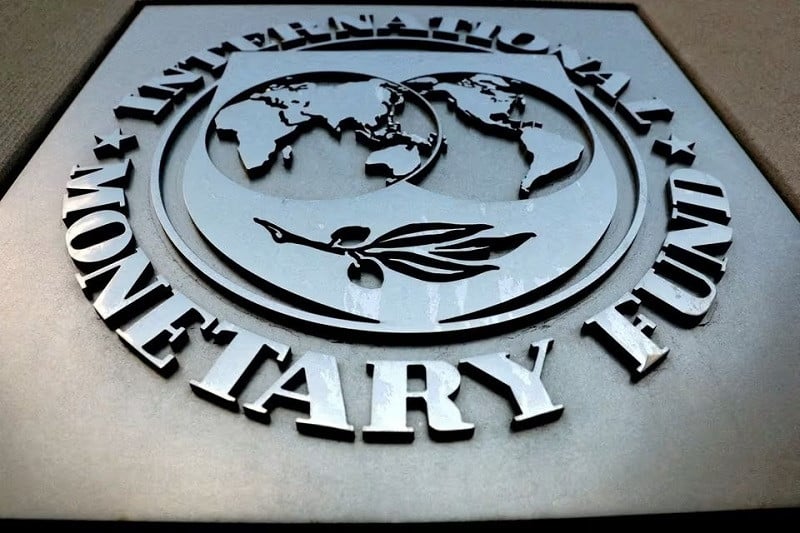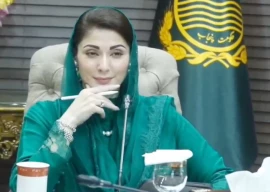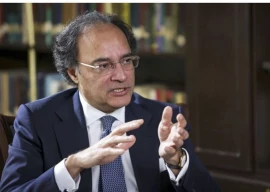
Federal Minister for Finance Muhammad Aurangzeb has expressed expectations for a significant bailout programme of $8 billion from the International Monetary Fund (IMF), emphasizing the need to improve the distribution of revenues between provinces and the center.
Speaking to journalists and a think tank group in Washington, the finance minister stated that if the loan is approved, Islamabad will review its National Finance Commission (NFC) Award, which allocates revenues between the federal and provincial governments.
He highlighted the need to bring certain sectors into the tax net, particularly some provincial markets. The finance minister stated that Pakistan is seeking a "large and long-term" loan programme from the IMF, with ongoing discussions with IMF authorities.
Minister Aurangzeb is currently in the United States to participate in meetings with the IMF and World Bank, along with his team, to request a new fiscal package. He further mentioned that once the mission returns to Islamabad, they will align their priorities and principles.
He noted that Pakistan had signed a short-term agreement with the IMF in 2023, following the conclusion of a $3 billion package.
Now, after the expiry of the $3 billion package, Pakistan is seeking a new bailout package of up to $8 billion.
During a meeting with Martin Raiser, the World Bank’s Vice President for the South Asia Region, Aurangzeb expressed satisfaction with the finalization of the Country Partnership Framework. He informed the World Bank official that the Pakistani government was meeting its targets in energy, tax reforms, and state-owned enterprises.
Additionally, both parties aligned on priorities concerning climate change, digitalization, and human development, and discussed reforms in the agricultural sector, water management, and wastewater treatment.
In a related development, the IMF Executive Board has scheduled Pakistan’s economic review in its meeting agenda until April 29.
Earlier this year, on March 20, the IMF and Pakistani authorities reached a staff-level agreement for the release of the last tranche of a $3 billion bailout, amounting to $1.1 billion.
This release is conditional upon Islamabad's commitment to implementing a compulsory tax registration scheme for retailers and further adjusting gas and electricity prices as needed, with Pakistan set to gain access to approximately $1.1 billion subject to the approval of the IMF’s Executive Board.
Muhammad Aurangzeb on Saturday also addressed concerns of the rating agencies on the external side, inflation, primary balance and the interest rate regime.
The minister met with the representatives of S&P Global and Fitch Ratings, a statement issued in the federal capital said.
The minister shared an update on the positive indicators of the country on the back of Standby Arrangement (SBA) signed with the International Monetary Fund (IMF).
He highlighted ongoing reforms in the priority areas of taxation, energy and privatisation over the short, medium and long-term horizon.
He also referred to his meetings with the IMF managing director, World Bank president and other multilateral institutions including AIIB and ADB.
The finance minister reaffirmed that the World Bank agenda of climate change, digitalisation and human development aligned with priorities of the government. He also mentioned potential Saudi investments which are in the pipeline.
Aurangzeb also expressed the expectation of a larger bailout programme from the IMF and considered improving the revenue distribution between the provinces and the Centre.
Speaking to a group of journalists and think-tanks in Washington, the minister said, if the loan is approved, Islamabad would revisit its NFC award that allocates revenues between the federation and the provinces. He said some of the sectors which need to be brought in a much bigger way into the tax net were provincial markets.
Pakistan is requesting a “larger and longer” multi-billion-dollar loan programme from the IMF and discussions are underway with the Fund’s officials, the finance minister said, without specifying how much the nation was trying to secure.
Aurangzeb, who is in the US capital with his team to participate in the IMF and World Bank’s meetings and request a new financial package, said once the mission is back in Islamabad, “we are going to agree on the priorities and the principles”.
“I believe it is Pakistan’s programme. It is not an IMF programme. It is Pakistan's programme and it is supported, assisted and funded by the IMF. What’s the size, and the reality and where we are, it’s premature to talk about that. We have our own views and we’ll share them with the IMF. But I would rather leave it to the joint meetings in terms of the size and the duration of the programme,” he said.
Asked by TRT World if Islamabad would revisit its National Finance Commission (NFC) award for the allocation of revenues between the federation and the provinces once IMF approves the new loan programme, Aurangzeb said, Pakistan needs to review it in the context of 18th Amendment where a lot of stuff has been devolved to the provinces.
“It is a discussion which we will have with the provinces in terms of either expenditure sharing or requesting them to incentivise to bring up the tax base, because the reality is, after the 18th Amendment and the NFC award, some of the sectors which need to be brought in a much bigger way into the tax net are actually provincial markets,” he said.
“Whether it is agriculture, real estate or property construction, we can help support systems, but it is for them to actually go ahead and do it,” he noted, adding that he has already engaged with the chief ministers of Punjab and Sindh with respect to starting the dialogue.
“Pakistan signed a short-term agreement with the IMF in 2023. Pakistan is seeking a new bailout of up to $8 billion when the current one of $3 billion expires.”
The finance minister’s visit to the US comes as the IMF published its updated World Economic Outlook that shows Pakistan will grow at 2 per cent. The IMF has kept the country’s growth rate at 3.5 per cent for the next fiscal year.
Meanwhile, Aurangzeb has ruled out any further significant rupee devaluation.




1730959638-0/trump-(19)1730959638-0-165x106.webp)















COMMENTS (2)
Comments are moderated and generally will be posted if they are on-topic and not abusive.
For more information, please see our Comments FAQ